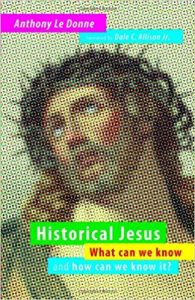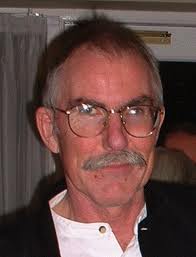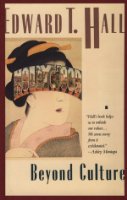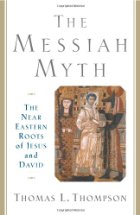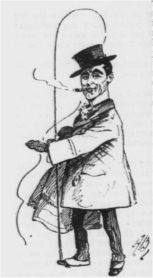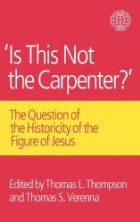 Emanuel Pfoh‘s chapter in ‘Is This Not the Carpenter?’ raises the questions that I think get to the very heart of what the “historicist-mythicist” divide over Christian origins is really all about. It’s a favourite of mine, and once again like another favourite that I’ll mention again in this post, comes from an anthropological perspective. The title of his chapter is “Jesus and the Mythic Mind: An Epistemological Problem”.
Emanuel Pfoh‘s chapter in ‘Is This Not the Carpenter?’ raises the questions that I think get to the very heart of what the “historicist-mythicist” divide over Christian origins is really all about. It’s a favourite of mine, and once again like another favourite that I’ll mention again in this post, comes from an anthropological perspective. The title of his chapter is “Jesus and the Mythic Mind: An Epistemological Problem”.
His chapter concludes the first of the three divisions into which the book is divided:
1. These first five chapters — by Jim West, Roland Boer, Lester L. Grabbe, Niels Peter Lemche and Emmanuel Pfoh — tackle “some problems and issues of past scholarship regarding the historical Jesus”.
2. The next section of three chapters (Robert M. Price, Morgens Müller, Thomas S. Verenna) raises “fresh perspectives regarding the figure of Paul and his epistles as our ‘earliest testimony’ of the figure of Jesus”. (I finally have come to appreciate the reference to “the figure of” Jesus as opposed to (simply) “Jesus”: the “figure of Jesus” is an umbrella term that can cover imaginary, mythical, historical-conceptual, or literal-physical-DNA Jesuses.)
3. The final section of the book consists of four chapters (James G. Crossley, Thomas L. Thompson, Ingrid Hjelm, Joshua Sabith) on the “intertextual literary reading and the significance of the function of a rewritten Bible for literary composition”, and a fifth and final chapter by K. L. Noll as a theoretical discussion of “the history of Christian origins without a historical Jesus.”
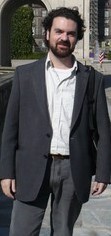 In this chapter Pfoh examines the current research into the historical Jesus in the context of the “historical milieu of previous scholarship”. He draws lessons from the past — how social, political, ideological and intellectual contexts of past studies have influenced the results produced by that scholarship — and makes some incisive observations about the real nature of current historical Jesus studies as a result.
In this chapter Pfoh examines the current research into the historical Jesus in the context of the “historical milieu of previous scholarship”. He draws lessons from the past — how social, political, ideological and intellectual contexts of past studies have influenced the results produced by that scholarship — and makes some incisive observations about the real nature of current historical Jesus studies as a result.
“But he’s not a New Testament scholar”
Emanuel Pfoh begins by clarifying his “outsider” status to the field of New Testament studies. His special interest is in historical anthropology of Syria-Palestine/the Levant during the Bronze and Iron Ages. That would seem to immediately disqualify him from any contribution to the discussion of Jesus according to Bart Ehrman, Maurice Casey and James McGrath. (These have each rejected statements by Thomas L. Thompson on those grounds.)
What his chapter is about
Pfoh explains that he offers
only general statements and thoughts . . . regarding epistemological and methodological issues for the history-writing of the Near Eastern world, in which the figure of Jesus together with the whole of biblical traditions should be understood.
My main aim is to reflect, from strictly historical knowledge and what is to be deemed myth or mythic creation by ancient writers. (my emphases and formatting throughout)
That is, his chapter can be seen as
reflections of the methodological problems of the search for a historical Jesus in New Testament studies that should be acknowledged, addressed and responded to by scholars, but also as a plea for a critical understanding of the nature of ancient literature and the intellectual worlds supporting such.
What I believe Pfoh’s discussion does — though this is not something he directly addresses — is undermine the validity of the application of “historical criteria” to uncover a “historical Jesus” beneath the Gospels. Quite apart from the logical validity of the criteria themselves (criteria of embarrassment, double dissimilarity, coherence, multiple attestation, etc) Pfoh’s reflections argue that it is no more reasonable to think they can uncover a “historical core” beneath the Gospels than they might uncover an historical Achilles or Odysseus if applied to Homer.
Some will immediately fault such an approach as “sceptical” as if scepticism is a bad word in academia. Pfoh will later point out
All this is not a matter of scepticism, but of an awareness of the conditions of our knowledge and of an attempt to treat the extant and available data critically. (p. 85, my emphasis — ironic that a scholar appears to sense a need to defend against a potential charge of scepticism)
.
The Figure of Jesus and the Mythic Mind
The main reason for holding to the historicity of the figure of Jesus . . . resides not primarily in historical evidence but derives instead from a modern theological necessity.
Pfoh writes that “the presence of the mythic mind in the intellectual world of antiquity” is not always taken seriously by “biblical scholars”.
Continue reading “Why Historical Knowledge of Jesus Is Impossible: ‘Is This Not the Carpenter?’ chapter 5”
Like this:
Like Loading...
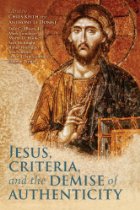 Continuing from Historical Method versus Jesus Research: Chapter 2 of Jesus, Criteria and the Demise of Authenticity. . . .
Continuing from Historical Method versus Jesus Research: Chapter 2 of Jesus, Criteria and the Demise of Authenticity. . . .


